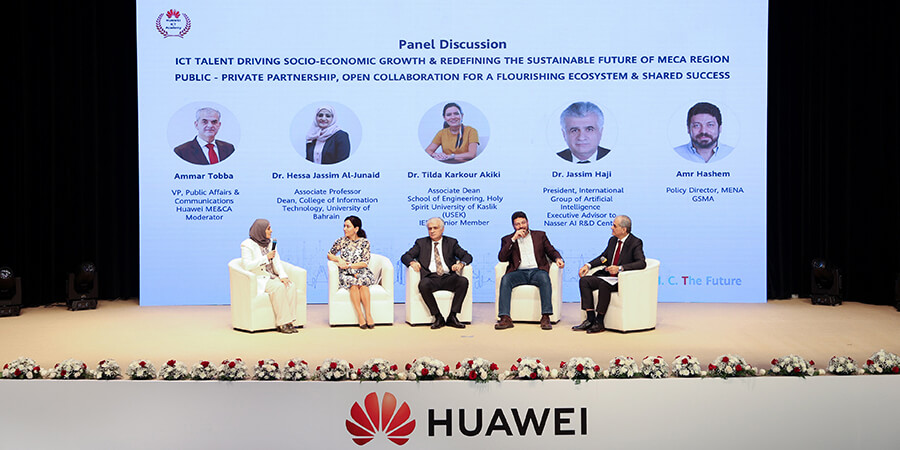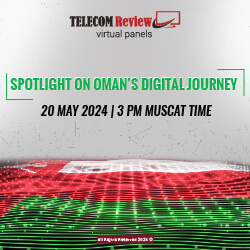The Middle East and Central Asia’s primary source of wealth is talent— a catalyst for our future intelligent societies. In this new era, digital talent drives digital transformation, unleashing digital productivity. As we stand at the precipice of a new era of digital revolution powered by 5.5G, AI, Cloud, and more, building a strong backbone of talent will help solidify our continuous economic growth.
A recent ICT talent cultivation forum in Bahrain brought together academic and industry experts to discuss challenges and opportunities in building the ICT talent ecosystem. They also discussed the importance of public-private partnerships in nurturing ICT talent innovations, supporting university curriculums with practical skills and training, and driving socio-economic growth in the region.
Some of the esteemed speakers on the panel included: Dr. Jassim Haji, President of International Group of Artificial Intelligence; Dr. Hessa Jassim Al-Junaid, Dean of the College of Information Technology, University of Bahrain; Dr. Tilda Karkour Akiki, Associate Dean of the School of Engineering, Holy Spirit University of Kaslik (USEK); and Amr Hashem, Policy Director, GSMA MENA. The discussion was moderated by Ammar Tobba, VP, Public Affairs and Communications, Huawei Middle East and Central Asia Region.
The forum was held alongside the Huawei ICT Competition 2023-2024 regional final awards ceremony at the University of Bahrain, and was attended by university students and tutors, government partners, ICT professionals, academia, and media representatives from 11 Middle East and Central Asia participating countries. During this discussion, the panelists shared their thoughts on driving digital transformation, building a sustainable knowledge-based digital economy in the region, and raising national competitiveness in line with the governments’ national plans and visions.
As a global ICT leader, Huawei has been keen to push the boundaries in the talent ecosystem through its successful CSR programs, such as Huawei ICT Academy, Seeds for the Future, ICT Competition, and much more. Huawei's ICT Competition, launched in 2017, has become the most significant and impactful initiative in the region. It is a potent program that focuses on developing ICT talent and enhancing the national competitiveness of countries through the cultivation of future ICT leaders. The competition has garnered support and endorsement from UNESCO, over 20 regional ministries, operators, and industry partners.
Dr. Hessa Jassim Al-Junaid, Dean of the College of Information Technology, University of Bahrain, underlined the importance of an open collaboration between universities and the public and private sectors to develop curriculum and upskilling students on the latest technologies, such as 5G and Cyber Security. She stated, “The Huawei ICT Talent initiative offers students practical skill development opportunities through hands-on challenges and real-world scenarios facilitated by Huawei professionals and experts. It fosters critical thinking and confidence-building among participants. Winning or receiving recognition in the competition can serve as a valuable addition to a student's academic portfolio, highlighting their accomplishments.”
“Annually, the Huawei ICT Talent competition attracts a growing number of registered students, indicating its increasing popularity. The IT students who have taken part in the Huawei ICT Talent competition have demonstrated high employability due to the competition's provision of relevant skills, industry knowledge, problem-solving abilities, teamwork experience, and industry recognition. Additionally, the competition encourages students to pursue Huawei professional certifications that hold international recognition,” Dr. Hessa added.
This year, a record-breaking number of more than 27,500 students from over 600 universities across 21 Middle Eastern and Central Asian countries participated in the Huawei ICT Competition. This marks the highest participation level in the competition's seven-year history. The regional finals were held in the Kingdom of Bahrain from December 19-21, 2023, and saw 22 teams, consisting of 66 national winners from 11 Middle Eastern and Central Asian countries including Bahrain, Pakistan, Iraq, Saudi Arabia, Lebanon, Jordan, Kazakhstan, Qatar, Kuwait, UAE, and Oman, competing for the top spot.
One of the expert panelists, Dr. Jassim Haji, President of the International Group of Artificial Intelligence and Executive Advisor to Nasser AI R&D Centre, focused on highlighting the importance of AI and how students can build essential skills to prepare for an AI-led digital future. He explained, “AI tools are poised to transform the way talented students learn and create, offering a wealth of benefits such as guidelines in the job market, course selection, and curriculum advisory. Furthermore, Generative AI creates tests tailored to each student's learning preferences, interactive activities, or even life-like simulations.”
His remarks come at a timely moment, as a recent study by PwC estimated that AI could contribute up to USD 15.7 trillion to the global economy by 2030. Upskilling young ICT talents in AI will go a long way in narrowing the digital talent gap.
The panel also had representation from GSMA, a global organization unifying the mobile ecosystem to discover, develop, and deliver innovation that is foundational to positive business environments and societal change. Amr Hashem, Policy Director, GSMA MENA, shared his remarks on cultivating young talent for the telecommunications industry, especially in light of the accelerated deployment of 5G. He said, “At the GSMA, we believe that investing in the development of ICT talent is crucial for the future success of the telecommunications industry. The rapid deployment of 5G technology requires a skilled workforce capable of driving innovation and meeting the evolving demands of the digital era. By fostering collaboration between academia and industry through initiatives like the Huawei ICT Competition, we can empower the next generation of professionals and ensure a sustainable and thriving future for the ICT sector in the Middle East and Central Asia.”
Ammar Tobba, VP, Public Affairs and Communications, Huawei ME&CA Region, shared, “ICT talent development programs like the Huawei ICT Competition contribute towards bridging the digital divide and narrowing the digital skills gap, nurturing young industry talents and strengthening the ICT talent ecosystem across the region. As a global technology leader, Huawei is committed to supporting the national plans and vision of regional governments to build a robust knowledge-based digital economy, driven by local talents.”
Huawei has been present in the Middle East for over two decades and has been providing open, flexible, and secure ICT infrastructure to bridge the digital divide for more than 3,500 enterprises and over 1.2 billion people in these two geographies. Huawei plays a key role in driving digital transformation in the Middle East and Central Asia (ME and CA), contributing to regional goals through the development of ICT ecosystems and the provision of advanced products and solutions for carriers, enterprises, cloud services, digital power, and consumers.
With its industry-leading innovations, Huawei continues to push the deployment of 5G and has already introduced 5.5G to the region in collaboration with multiple regional carriers. Huawei has also expanded and advanced its cloud business by opening new cloud regions in ME and CA. It has also grown its digital power business, helping facilitate carriers' shift from energy consumers to energy producers and enablers, aligning with government carbon emissions reduction objectives.










